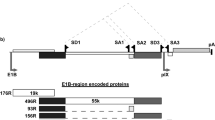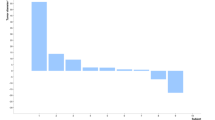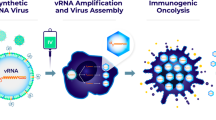Abstract
Oncolytic (replication-competent) adenoviruses as anticancer agents provide new, promising tools to fight cancer. In support of a Phase I clinical trial, here we report safety data with INGN 007 (VRX-007), an oncolytic adenovirus with increased anti-tumor efficacy due to overexpression of the adenovirus-encoded ADP protein. Wild-type adenovirus type 5 (Ad5) and a replication-defective version of Ad5 were also studied as controls. A parallel study investigating the biodistribution of these viruses is described elsewhere in this issue. The toxicology experiments were conducted in two species, the Syrian hamster, which is permissive for INGN 007 and Ad5 replication and the poorly permissive mouse. The studies demonstrated that the safety profile of INGN 007 is similar to Ad5. Both viruses caused transient liver damage upon intravenous injection that resolved by 28 days post-infection. The No-Observable-Adverse-Effect-Level (NOAEL) for INGN 007 in hamsters was 3 × 1010 viral particles per kg. In hamsters, the replication-defective vector caused less toxicity, indicating that replication of Ad vectors in the host is an important factor in pathogenesis. With mice, INGN 007 and Ad5 caused toxicity comparable to the replication-defective adenovirus vector. Partially based on these results, the FDA granted permission to enter into a Phase I clinical trial with INGN 007.
This is a preview of subscription content, access via your institution
Access options
Subscribe to this journal
Receive 12 print issues and online access
$259.00 per year
only $21.58 per issue
Buy this article
- Purchase on Springer Link
- Instant access to full article PDF
Prices may be subject to local taxes which are calculated during checkout







Similar content being viewed by others
References
Wold WSM, Horwitz MS . Adenoviruses. In: Knipe DM, Howley PM (eds). Field's Virology, 5th edn. Lippincott, Williams, & Wilkins: Philadelphia, PA, 2007: 2395–2436.
Jiang H, McCormick F, Lang FF, Gomez-Manzano C, Fueyo J . Oncolytic adenoviruses as antiglioma agents. Expert Rev Anticancer Ther 2006; 6: 697–708.
Jounaidi Y, Doloff JC, Waxman DJ . Conditionally replicating adenoviruses for cancer treatment. Curr Cancer Drug Targets 2007; 7: 285–301.
Thorne SH, Hermiston T, Kirn D . Oncolytic virotherapy: approaches to tumor targeting and enhancing antitumor effects. Semin Oncol 2005; 32: 537–548.
Young LS, Searle PF, Onion D, Mautner V . Viral gene therapy strategies: from basic science to clinical application. J Pathol 2006; 208: 299–318.
Cattaneo R, Miest T, Shashkova EV, Barry MA . Reprogrammed viruses as cancer therapeutics: targeted, armed and shielded. Nat Rev Microbiol 2008; 6: 529–540.
Shirakawa T . The current status of adenovirus-based cancer gene therapy. Mol Cells 2008; 25: 462–466.
Nemunaitis J, Edelman J . Selectively replicating viral vectors. Cancer Gene Ther 2002; 9: 987–1000.
Nemunaitis J, Vorhies JS, Pappen B, Senzer N . 10-year follow-up of gene-modified adenoviral-based therapy in 146 non-small-cell lung cancer patients. Cancer Gene Ther 2007; 14: 762–763.
Post LE . Selectively replicating adenoviruses for cancer therapy: an update on clinical development. Curr Opin Invest Drugs 2002; 3: 1768–1772.
Reid T, Warren R, Kirn D . Intravascular adenoviral agents in cancer patients: Lessons from clinical trials. Cancer Gene Ther 2002; 9: 979–986.
Doronin K, Toth K, Kuppuswamy M, Ward P, Tollefson AE, Wold WSM . Tumor-specific, replication-competent adenovirus vectors overexpressing the Adenovirus Death Protein. J Virol 2000; 74: 6147–6155.
Doronin K, Toth K, Kuppuswamy M, Krajcsi P, Tollefson AE, Wold WSM . Overexpression of the ADP (E3-11.6K) protein increases cell lysis and spread of adenovirus. Virology 2003; 305: 378–387.
Doronin K, Kuppuswamy M, Toth K, Tollefson AE, Krajcsi P, Krougliak V et al. Tissue-specific, tumor-selective, replication-competent adenovirus vector for cancer gene therapy. J Virol 2001; 75: 3314–3324.
Kuppuswamy M, Spencer JF, Doronin K, Tollefson AE, Wold WS, Toth K . Oncolytic adenovirus that overproduces ADP and replicates selectively in tumors due to hTERT promoter-regulated E4 gene expression. Gene Therapy 2005; 12: 1608–1617.
Toth K, Djeha H, Ying BL, Tollefson AE, Kuppuswamy M, Doronin K et al. An oncolytic adenovirus vector combining enhanced cell-to-cell spreading, mediated by the ADP cytolytic protein, with selective replication in cancer cells with deregulated Wnt signaling. Cancer Res 2004; 64: 3638–3644.
Shashkova EV, Spencer JF, Wold WSM, Doronin K . Human interferon-alpha expression increases antitumor efficacy and reduces hepatotoxicity of E1A-mutated spread-enhanced oncolytic adenovirus. Mol Ther 2007; 15: 598–607.
Thomas MA, Spencer JF, La Regina MC, Dhar D, Tollefson AE, Toth K et al. Syrian hamster as a permissive immunocompetent animal model for the study of oncolytic adenovirus vectors. Cancer Res 2006; 66: 1270–1276.
Thomas MA, Spencer JF, Toth K, Sagartz JE, Phillips N, Wold WSM . Immunosuppression enhances oncolytic adenovirus replication and anti tumor efficacy in the Syrian hamster model. Mol Ther 2008; 16: 1665–1673.
Toth K, Spencer JF, Tollefson AE, Kuppuswamy M, Doronin K, Lichtenstein DL et al. Cotton rat tumor model for the evaluation of oncolytic adenoviruses. Hum Gene Ther 2005; 16: 139–146.
Heise CC, Williams AM, Xue S, Propst M, Kirn DH . Intravenous administration of ONYX-015, a selectively replicating adenovirus, induces antitumoral efficacy. Cancer Res 1999; 59: 2623–2628.
Lieber A, He CY, Meuse L, Schowalter D, Kirillova I, Winther B et al. The role of Kupffer cell activation and viral gene expression in early liver toxicity after infusion of recombinant adenovirus vectors. J Virol 1997; 71: 8798–8807.
Liu Q, Muruve DA . Molecular basis of the inflammatory response to adenovirus vectors. Gene Therapy 2003; 10: 935–940.
Sauthoff H, Hu J, Maca C, Goldman M, Heitner S, Yee H et al. Intratumoral spread of wild-type adenovirus is limited after local injection of human xenograft tumors: virus persists and spreads systemically at late time points. Hum Gene Ther 2003; 14: 425–433.
Varnavski AN, Calcedo R, Bove M, Gao G, Wilson JM . Evaluation of toxicity from high-dose systemic administration of recombinant adenovirus vector in vector-naive and pre-immunized mice. Gene Therapy 2005; 12: 427–436.
Zhang Y, Chirmule N, Gao GP, Qian R, Croyle M, Joshi B et al. Acute cytokine response to systemic adenoviral vectors in mice is mediated by dendritic cells and macrophages. Mol Ther 2001; 3: 697–707.
Hjorth RN, Bonde GM, Pierzchala WA, Vernon SK, Wiener FP, Levner MH et al. A new hamster model for adenoviral vaccination. Arch Virol 1988; 100: 279–283.
Toth K, Spencer JF, Dhar D, Sagartz JE, Buller RM, Painter GR et al. Hexadecyloxypropyl-cidofovir, CMX001, prevents adenovirus-induced mortality in a permissive, immunosuppressed animal model. Proc Natl Acad Sci USA 2008; 105: 7293–7297.
Jogler C, Hoffmann D, Theegarten D, Grunwald T, Uberla K, Wildner O . Replication properties of human adenovirus in vivo and in cultures of primary cells from different animal species. J Virol 2006; 80: 3549–3558.
Mccoy RD, Davidson BL, Roessler BJ, Huffnagle GB, Janich SL, Laing TJ et al. Pulmonary inflammation induced by incomplete or inactivated adenoviral particles. Human Gene Ther 1995; 6: 1553–1560.
Schnell MA, Zhang Y, Tazelaar J, Gao GP, Yu QC, Qian R et al. Activation of innate immunity in nonhuman primates following intraportal administration of adenoviral vectors. Mol Ther 2001; 3: 708–722.
Varnavski AN, Zhang Y, Schnell M, Tazelaar J, Louboutin JP, Yu QC et al. Preexisting immunity to adenovirus in rhesus monkeys fails to prevent vector-induced toxicity. J Virol 2002; 76: 5711–5719.
Acknowledgements
This research was supported by Grants CA118022, CA108335 and CA81829 to WSMW.
Author information
Authors and Affiliations
Corresponding author
Additional information
Supplementary Information accompanies the paper on Cancer Gene Therapy website (http://www.nature.com/cgt)
Supplementary information
Rights and permissions
About this article
Cite this article
Lichtenstein, D., Spencer, J., Doronin, K. et al. An acute toxicology study with INGN 007, an oncolytic adenovirus vector, in mice and permissive Syrian hamsters; comparisons with wild-type Ad5 and a replication-defective adenovirus vector. Cancer Gene Ther 16, 644–654 (2009). https://doi.org/10.1038/cgt.2009.5
Received:
Revised:
Accepted:
Published:
Issue Date:
DOI: https://doi.org/10.1038/cgt.2009.5
Keywords
This article is cited by
-
Local sustained delivery of oncolytic adenovirus with injectable alginate gel for cancer virotherapy
Gene Therapy (2013)
-
The role of cyclophosphamide in enhancing antitumor efficacy of an adenovirus oncolytic vector in subcutaneous Syrian hamster tumors
Cancer Gene Therapy (2013)
-
Mining the adenovirus virome for oncolytics against multiple solid tumor types
Cancer Gene Therapy (2011)
-
A fully replication-competent adenovirus vector with enhanced oncolytic properties
Cancer Gene Therapy (2010)
-
Current Issues and Future Directions of Oncolytic Adenoviruses
Molecular Therapy (2010)



